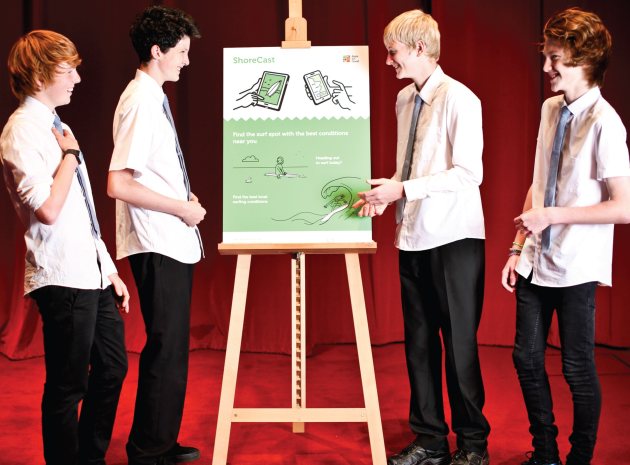Sal MeKeown finds out more about a competition that is encouraging young people to turn problems into prototypes…
Did you know that the surfing in Southend in February this year was rubbish? It’s true – in fact, while Bude was managing swells of three to four feet, Southend was ‘flat’. Now, I’m no surfer, but I can say this with confidence, having recently met the team of secondary school students behind a new iPhone app called ShoreCast. Actual surfers will travel a long way to indulge their passion but are often disappointed when they reach their destination. ShoreCast is set to change that – and it was the winning entry in the My Planet category of this year’s Apps for Good competition.
The first thing schools need to know about Apps for Good is that it’s big. This year it has 470 Education Partners and involves over 25,000 students across the whole of the UK. Young people aged 10-18 work in teams in school and get advice from industry experts, either in person, by phone or via Skype. The goal is to create an app to solve a real problem. Along the way, students learn how to pitch, design, negotiate and to become digital creators.
Last year featured some big name judges including Baroness Martha Lane Fox, digital champion and co-founder of Lastminute.com, and Gerard Grech, CEO of Tech City. The sponsors are household names - Facebook, Barclaycard, Samsung, SAP, TalkTalk, Tech London Advocates and Thomson Reuters - so the whole process is high profile and glamorous.
Apps for Good provides the course content, training for teachers and access to its network of expert volunteers. Teams have to find an issue they care about, or a problem they want to solve, and learn to build a mobile, web or social app. Shortlisted teams go to London in June to present their app at a Dragons Den style event and pitch to a selected audience. Last year there were seven winners and they were matched up with development agency partners to have their app built professionally. In February, they launched the apps on Google Play or the Apple App Store.
Winning ways
Budehaven Community School in Cornwall has excellent technology resources. Four years ago ICT coordinator Ivan Langton first heard about Apps for Good via Twitter - shortly after it was launched - and decided to follow it up. The schools involvement in the competition has proved to be a stunning success and it is now embedded in the curriculum, in the year 9 computing course.
As well as garnering technical skills, students gain in confidence. Experts come in and help them refine their ideas, develop an elevator pitch and deliver top quality professional presentations. All of these are soft skills, which could perhaps have been nurtured via an enterprise course - but Langton is adamant that Apps for Good is the way forward because students learn computing alongside entrepreneurial skills as part the curriculum in a real life scenario.
The winning team from Budehaven Community School - Jay, Archie, Ben and Tom - did all the hard work in year 9. Having tried and rejected an app aimed at dog walkers showing which local shops would welcome hounds, and an app to combine social media accounts Facebook and Twitter, they decided to tap into Archie Hedge-Evans’ passion for surfing. Their research showed that most of the apps available were disappointing so they decided to create their own.
Professional partnership
Archie was the content expert but the others started to find and define their own roles. Tom Fry is a teckie in the making. “I work in a computer shop at weekends and I have built a computer,” he explains. “I’m a geek.” He really enjoyed working with coding professionals at Fuerte - an app development company with offices in London, Prague and New York and A list clients such as Toyota, Carphone Warehouse and Skoda. He is now even more critical of other people’s surfing apps. “Some are quite tricky to use and unreliable,” he observes. “Some are cluttered and not very attractive. It is so easy to fix things on an app. I don’t know why they don’t improve them.”
Fuerte liked the Budehaven boys’ approach. “When a question came up, the team was already knowledgeable about what would work best for young surfers like them,” comments app development manager Zoe Coleman. “But like any digital project it wasn’t all smooth sailing. One key technical challenge the team faced was finding a good source of data for their app.”
Ben Morrison was responsible for how things looked and opted for a colour scheme of white text on a background of shades of blue. He discovered he had an eye for design and developed his skills throughout the year. “We had some help, especially when it came to describing the app,” he says. “It had to be as short as possible and not too complicated. It is quite different from the writing skills we need for many subjects in school.”
Real impact
Jay Bevan took on the social media aspect of the project, which is one of the key differences between Shorecast and other surfing apps. The group decided to focus on Twitter and Facebook. Early entries were about the process, the lessons and the Apps for Good scheme. They try to post every few days. They have 109 likes on Facebook and are active on Twitter. Jay’s advice for young people looking to develop a product presence is to keep going, keep telling people what’s happening, and make sure you thank people who tweet you. “Sometimes you feel like you’re repeating yourself but it is better to tweet too much than too little.” The best social media moment was when they were retweeted by a surfing magazine.
In February the teams returned to Canary Wharf, to the Thomson Reuters offices, for the official launch of their apps. The seven winning groups had a chance to see one another’s apps, to make suggestions for changes or additions and to identify possible marketing opportunities. The Budehaven app has come a long way from its inception – now users can simply click on a map of Great Britain and see at a glance which surf sites are rated. It is very accessible so novices can click on terms such as ‘swell height’ and get a simple explanation, and it incorporates a user star rating so surfers can share their opinions with a wider community.
Ben, Tom, Archie and Jay are now going on to GCSE computing and another year group has taken up the challenge of creating award winning apps. Whatever direction these four young people take in life, they have all been changed by the experience. As Debbie Forster, UK managing director of Apps for Good states, “Our mission at Apps for Good is to grow a generation of problem solvers and digital makers: young people who can create, launch and market new products that change their world. We want to unlock the enthusiasm and talent of young people, helping them to be more able, self-confident and collaborative, ready to make a difference in their world.”
You can buy Shorecast at appsforgood.org/public/awards/2014/shorecast and find out more about Apps for Good at appsforgood.org.
About the author
Sal McKeown is a freelance special needs journalist and author of the award-winning Brilliant Ideas for Using ICT in the Inclusive Classroom (Routledge) and a book for parents, How to help your Dyslexic and Dyspraxic Child (Crimson Publishing).









